In August 2019, after inspecting the cockpit of Russia’s then-new fifth-generation Su-57 fighter warplane, Turkish President Recep Tayyip Erdogan requested his Russian counterpart, Vladimir Putin, if it was on the market.
“Sure, you should purchase it,” Putin responded with a smile, as he enticed Erdogan with Russia’s newest overseas jets on the MAKS-2019 worldwide air present outdoors Moscow.
The duo, donned in darkish fits and darkish shades, toured different warplanes after which took a break to eat ice cream cones.
“Will you pay for me?” Erdogan requested Putin, nodding in the direction of the cones, to which Putin responded, “In fact, you’re my visitor”.
The alternate exemplified the renewed closeness of Turkish-Russian safety relations after a tough interval, throughout which Turkey downed a Russian fighter airplane that it mentioned had strayed throughout the border from Syria. However it additionally showcased Erdogan’s personality-driven strategy to overseas coverage throughout his two-decade rule.
As Turkey has sought to place itself as a regional heavyweight, the Justice and Improvement Get together, or AK Get together chief’s assured, if confrontational, type has formed the nation’s worldwide relations.
Turkey has definitely grown extra influential – not simply throughout the Center East, but in addition Africa and Europe, with its outstanding function in mediating between Russia and Ukraine a selected instance.
However a doable new successor is on the rise, with emboldened opposition chief Kemal Kilicdaroglu from the Republican Individuals’s Get together, or CHP presently holding an edge in opinion polls.
Kilicdaroglu, a social democratic politician additionally backed by 5 smaller events in an alliance in opposition to Erdogan, has promised to overturn the president’s legacy.
Sinan Ogan from the ATA alliance can also be vying for the highest spot. A former candidate, Muharrem Ince from the Homeland Get together dropped out of the race simply three days earlier than the election.
So, Turkey might enter a post-Erdogan period after Sunday’s presidential and parliamentary elections, and that might imply overseas coverage adjustments.
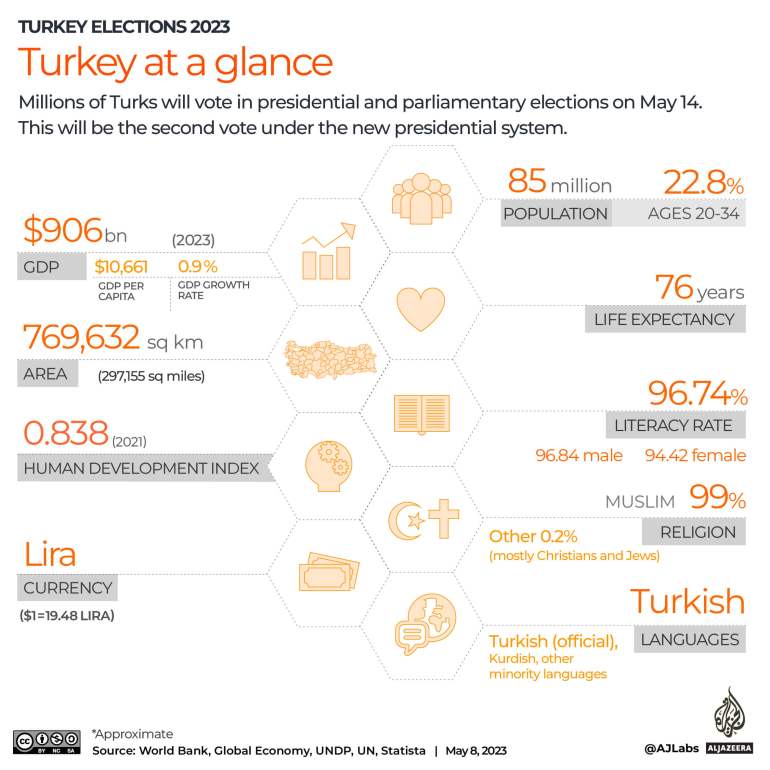
Character-driven to predictability?
If Erdogan’s reign was about pomp and character, the opposition’s – particularly below Kilicdaroglu – could also be extra muted and predictable.
“The type of overseas policymaking will change and that’s extra vital than issue-based adjustments as a result of presently overseas coverage is carried out totally [in] a personalised method,” Salim Cevik, a researcher at Stiftung Wissenschaft und Politik’s Middle for Utilized Turkey Research in Berlin, Germany, advised Al Jazeera.
Below Erdogan, overseas ministers and diplomats have largely been excluded from decision-making, with private relations between the president and overseas leaders waging a far better function, Cevik added.
“Turkey might be far more predictable as a result of it is going to be extra institutionalised,” the researcher mentioned.
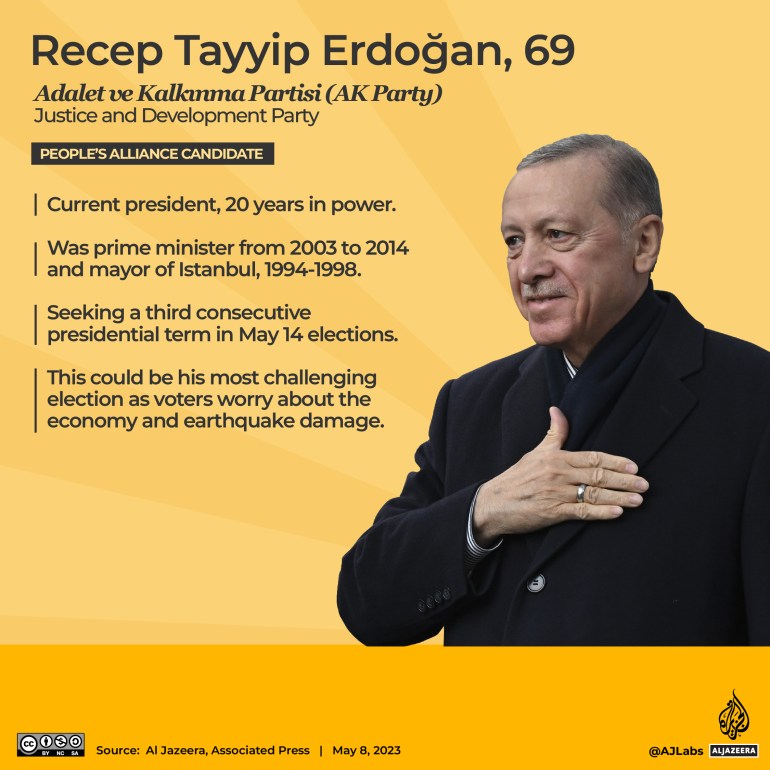
Sami Hamdi, the managing director at Worldwide Curiosity, a political threat agency specializing in the Center East, mentioned that Erdogan’s insurance policies are additionally aimed toward rising Turkey’s smooth energy, notably within the Muslim world, a continuation of the legacy of the Ottoman Empire, which dominated huge swaths of the Center East, North Africa and the Balkans for hundreds of years.
“Erdogan’s assertive nature has irked the most important powers who’re extra accustomed to Turkey’s historic function as a supporting actor,” Hamdi advised Al Jazeera.
“On the similar time, Turkey’s quickly increasing affect is rooted in Erdogan’s capability to capitalise on Islamic smooth energy by way of his ‘Muslim’ rhetoric, enabling him to advance quickly each politically and economically into [multiple regions],” he added.
Center East ties from navy interventions to normalisation
Erdogan’s overseas coverage has seen the chief flex his navy prowess throughout the Center East via interventions in Iraq, Libya, Syria and even past, in Azerbaijan.
In Iraq and Syria, Turkey’s navy actions have centered on stamping out threats it noticed as linked to the banned Kurdistan Workers’ Party (PKK), which has been waging a lethal battle in opposition to the Turkish state that has killed tens of hundreds for the reason that Eighties.
As such, Ankara has spent a long time combating predominantly Kurdish forces in northern Iraq, and controls a number of areas alongside its borders with Syria, with the intention to crush the People’s Protection Units (YPG), the US-backed forces Ankara considers an offshoot of the PKK.
In Libya, Turkey intervened to support the United Nations-recognised Authorities of Nationwide Accord (GNA) in Tripoli in opposition to eastern-based forces and in 2020, backed Azerbaijan in a struggle with Armenia over the disputed Nagorno-Karabakh area.
On paper at the least, the CHP has mentioned it would reverse course and tackle a non-interventionist function, in response to the social gathering’s platform.
“We’ll respect the independence, sovereignty and territorial integrity of the nations within the Center East, is not going to intrude of their inner affairs, and won’t ‘take sides’ within the issues between them however ‘facilitate options,’” the platform learn.
Sinan Ulgen, a senior fellow at Carnegie Europe in Brussels, Belgium, mentioned Turkey’s non-interference in different nations’ home affairs had been a pre-Erdogan precept, however the opposition pulling out of Syria and Libya would nonetheless be conditional on Ankara’s pursuits being protected there.
“That may be conditional on an general settlement with [Damascus and Tripoli] that may shield its pursuits,” Ulgen advised Al Jazeera.
Cevik was much less inclined to agree {that a} pull-out from the 2 locations would happen below an opposition authorities so rapidly, however Turkey will head in the direction of a much less militarily-aggressive period regardless, as a consequence of financial restraints.
“[The] Turkish economic system is unhealthy and have become even worse after the earthquake so the sources are restricted,” mentioned Cevik.
He pointed to Turkey’s latest extra diplomatic and muted responses to points that previously would have provoked Erdogan to a better extent, resembling Israeli attacks on Gaza, or the crackdown on the opposition in Tunisia.
Erdogan has already begun a brand new course by normalising ties with Arab states, a course of that may possible proceed below the opposition.
Turkey’s ties with Bahrain, Egypt, Saudi Arabia and the United Arab Emirates soured after Ankara supported the Muslim Brotherhood in Egypt and elsewhere in the course of the 2011 Arab uprisings.
In the meantime, Ankara’s nearer ties with Riyadh’s rival, Tehran, and the Saudi killing of journalist Jamal Khashoggi in Istanbul exacerbated these rifts.
“The motivation is to normalise the ties which were tarnished over the previous decade because of Turkey’s … confrontational, or interventionist, insurance policies within the area,” mentioned Cevik.
However Turkey may even see a dip in reputation within the area because it takes a step again from Center Japanese affairs, the researcher mentioned.
That may particularly be true below Kilicdaroglu, mentioned Hamdi, as he was seen because the candidate dedicated to “divorcing” Turkey from the Muslim world, whereas Erdogan has been seen as one dedicated to restoring Turkey to the Muslim world and re-defining Turkish id with an “Islamic stroke”.
“The picture of Turkey within the area will change dramatically if Kilicdaroglu wins,” mentioned Hamdi.
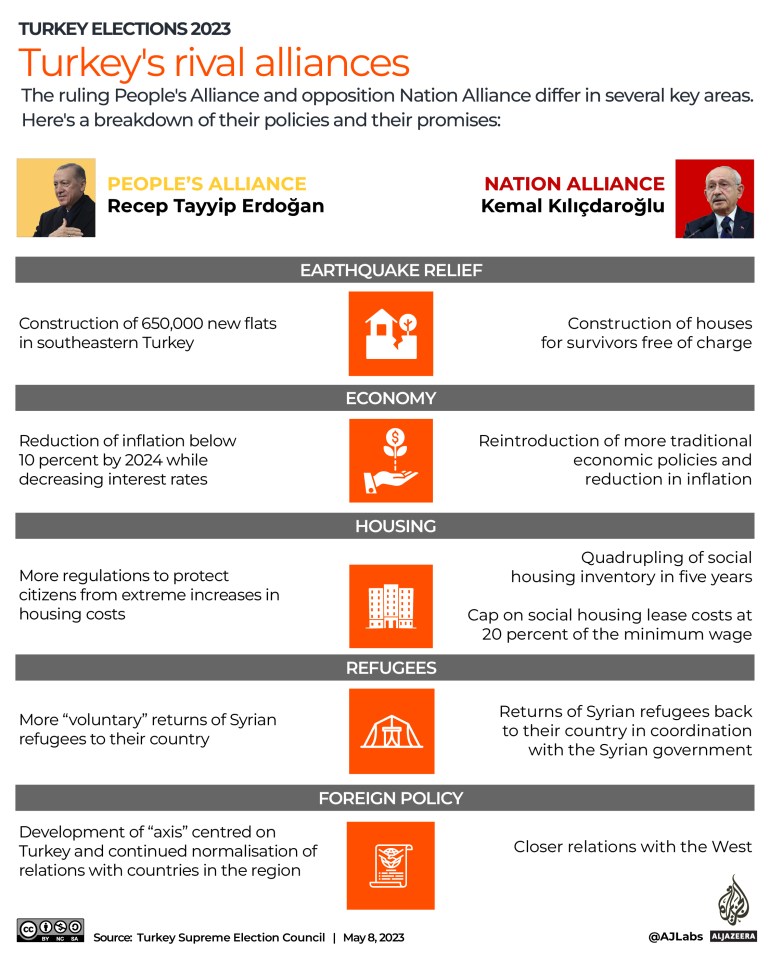
Ties with the West – from frosty to pleasant?
Maybe the place change in overseas coverage is almost certainly to happen with a change of presidency is in Turkey’s relations with the West.
“In keeping with the coverage platform of the opposition, the brand new Turkish overseas coverage will search to reassert Turkey’s Western vocation,” mentioned Ulgen.
An opposition-led authorities would search to enhance Turkey’s relations with its conventional companions within the West, specifically the European Union and the US, however the “consequence of this will even rely upon how Washington and Brussels react to the prospect of political change in Turkey,” he added.
The West might welcome Kilicdarolgu not as a consequence of its personal pursuits, however slightly as a result of he’s perceived as somebody much less assertive in imposing Turkish pursuits, mentioned Hamdi.
“A lot of Erdogan’s use of pressure has been the results of real fears in Ankara that one thing unhealthy is about to occur to Turkish pursuits, and that his allies haven’t taken these fears critically,” he defined.
In keeping with Cevik, a normal pro-Western outlook in overseas coverage has been the default for Turkey in even the AK Get together’s first decade in energy, after 2002.
Tensions have at all times existed, however even when Turkey was below a heavy American arms embargo within the Nineteen Seventies, “these tensions didn’t quantity to questioning Turkey’s membership within the wider Western geopolitical system,” he mentioned.
“Right now, that is questioned,” Cevik emphasised.
Others have argued that it’s the West that has pushed Turkey away.
Whereas most events in Turkey desire nearer ties and integration with Europe, Europe doesn’t take into account Turkey a part of its fold, and France, specifically, has been vocal about this, mentioned Hamdi.
“Consequently, Erdogan has shifted his priorities and positioned better significance on the Islamic world, the place Turkey has been ready develop new alliances, new ties, and quickly broaden its affect and smooth energy to turn out to be a significant – and extra unbiased – participant within the area,” mentioned Hamdi.
Erdogan was comparatively pleasant with former US President Donald Trump, however relations with present US President Joe Biden have been extra frosty.
Washington eliminated Ankara from its F-35 joint strike fighter programme in 2019 after Turkey bought S-400 air defence systems from Russia, programs incompatible with North Atlantic Treaty Group (NATO) ones.
The CHP’s platform promised to return Turkey to the F-35 programme, however doesn’t state whether or not Turkey would return the Russian programs.
Turkey has additionally been cautious of the US’s help for the YPG in Syria, formally via the Syrian Democratic Forces, of which it’s the main half.
Nonetheless, Turkey’s support for Ukraine and its reversal on its opposition to Finland joining NATO – whereas remaining unsure over Sweden – have spurred Washington to promote Ankara F-16 jets and different navy gear within the curiosity of NATO unity.
Below a possible new authorities, many of those points should stand however “there might be a willingness by the brand new Turkish authorities to deal with these points extra constructively”, mentioned Ulgen.
Equally, it would additionally “rely upon how a lot flexibility the US aspect might be prepared to show to resolve these points”, he added.
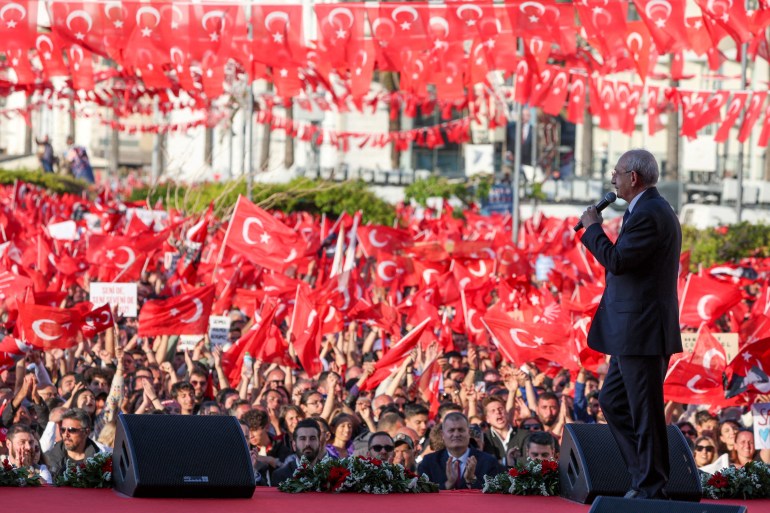
Some thorny points with the EU may additionally persist in a post-Erdogan period, specifically the Cyprus dispute and Turkey’s feud over maritime rights with Greece, the analysts mentioned.
Nonetheless, a notable distinction within the CHP’s platform was that it might concede to the EU accession course of demand that Turkey launch some Turkish political prisoners.
Regardless of soured relations over these issues throughout Erdogan’s rule, the EU has remained Turkey’s principal buying and selling accomplice and supply of overseas funding.
Whereas the Turkish opposition has remained dedicated to the EU accession observe, its ties with the regional bloc usually are not restricted to that, mentioned Ulgen. A brand new authorities will pursue every thing from visa liberalisation, to deeper cooperation within the areas of commerce, local weather, digital and past, he added.
Ties with non-Western powers, China and Russia
Though Turkey might heat as much as the West below the opposition, its ties to Russia and China would stay intact.
However the opposition, Ulgen mentioned, will search to stability its allies extra strategically than Erdogan did.
Past Su-57 warplanes and ice cream cones, Erdogan and Putin have little question held shut ties, with Turkey closely reliant on Russian power imports.
Even nonetheless, the 2 have backed opposing sides in Libya, Syria, and the Armenia-Azerbaijan battle. Turkey additionally condemned Russia’s invasion of Ukraine, supplying the latter with drones. It nonetheless, nevertheless, opposed Western sanctions on Russia, a balancing act that the opposition will possible proceed.
Equally, Turkey has allied with China for years, in 2015 becoming a member of its infrastructure-financing Belt and Road Initiative. Nonetheless, the persecution of the Uighur people – who’re Turkic and communicate a language just like Turkish – in China has been an under-the-rug subject between the 2 allies, with Erdogan accusing China of “genocide” in 2009, however not publicly urgent the difficulty since.
“China’s insurance policies on [the Uighur] entrance represent an obstacle to an enormous enchancment of the connection,” mentioned Ulgen.
The important thing distinction, then, between a 3rd Erdogan time period and a post-Erdogan period, would possible be that the incumbent candidate would proceed to foment these relations in a continued push away from the West, he mentioned.
“Below Erdogan, Turkish overseas coverage might be extra influenced by a drive to acquire a strategic autonomy from the West, which opens up more room to nations like Russia and China,” the analyst mentioned.
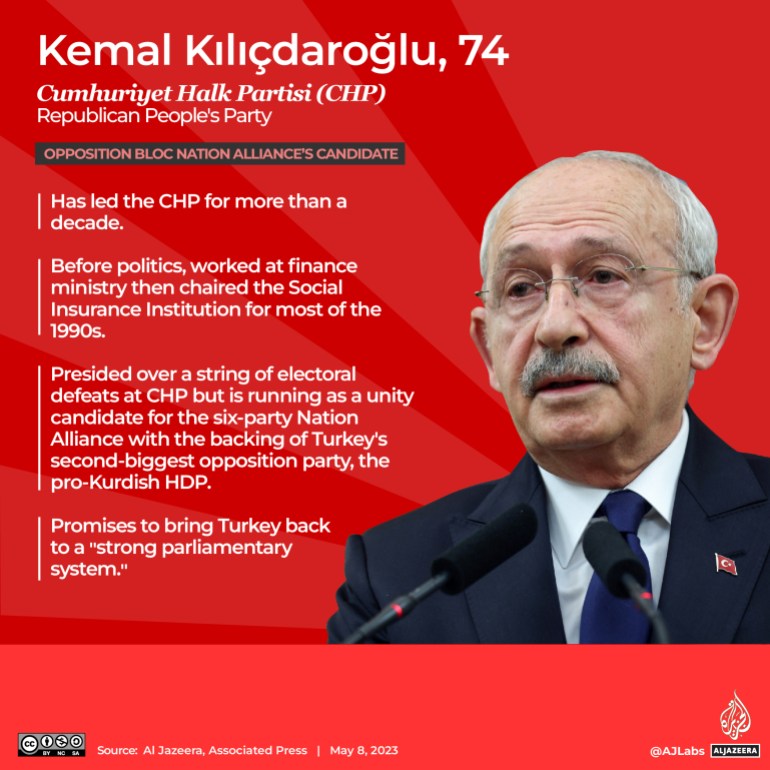
Ties with Africa
Turkey’s Africa coverage has largely been dictated by commerce and funding, mentioned Cevik, and can proceed regardless of who wins the election, as it’s thought-about successful.
“Most just lately, drones gross sales and arms cooperation turned an vital dimension of Turkish presence in Africa,” he mentioned. “I’m anticipating that to proceed however the brand new authorities could also be extra selective and fewer keen in promoting drones”.
On the cultural entrance, nevertheless, Turkish NGOs finishing up non secular actions on the continent might not have as a lot help from an incoming CHP-led authorities.
Consequently, Turkey’s cultural affect in Africa will proceed to some extent however might decelerate below the opposition, the researcher mentioned.
Hamdi agreed {that a} authorities below Kilicdaroglu wouldn’t be capable to be as influential in Africa as throughout Erdogan’s reign.
“Kilicdaroglu doesn’t evoke something of the resonance that Erdogan does, and Turkey’s financial and cultural affect is more likely to be vastly hampered if he turns into president,” he mentioned.
Ulgen, however, believed {that a} new authorities might collaborate with its Western companions to comprise the affect of China on the continent, with the intention to advance Turkish pursuits there.
A brand new worldwide place?
Twenty years of rule normal by Erdogan have modified Turkey in a number of methods, and its place on the earth, each positively and negatively, relying on who you ask.
A 3rd presidential win for Erdogan could be a vindication of his insurance policies since, mentioned Ulgen, regardless of his dipping reputation.
However the opposition – whereas nonetheless persevering with components of Erdogan’s overseas insurance policies – would search to reposition Turkey internationally by balancing its relations on the world stage, the analysts mentioned.
“[Turkey will] proceed to have strong relations with its neighbours and the non-West powers, Russia, China,” mentioned Ulgen.
“Nonetheless, this is able to not come to the detriment of Turkey’s geo-strategic alignment as a accomplice of the Western neighborhood of countries,” he added.





